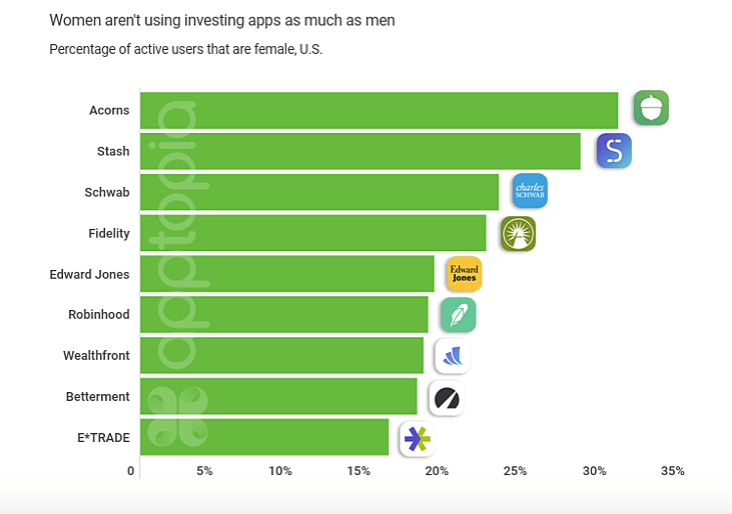
Women create almost half of the world’s population, but yet only 14% of them are involved in Bitcoin.
They also are better financially educated than ever before. However, when it comes to investing in digital assets even those women managing large capitals lack confidence.
“Women are terrified of for-profit investing”, says Jesse Draper, the founder of Halogen Ventures and investor in female-founded start-ups, bitcoin and blockchain. Why is that so? Do women feel unwelcome in the cryptocurrency world?
Numbers of female investors
The blockchain and crypto industry is highly based on mathematics, computer science and data mining. Since the beginning cryptocurrency space was dominated by men. Mostly due to historical reasons, as tech and financial industries were traditionally considered as men-oriented. The situation is changing today.
Sponsored
Women, especially young-generation ones are open to digital currencies. Up to 50% more of them used digital currencies in Q1 compared to the previous year.
Investment apps attain millions of new users. The trading platform eToro reported over 366% growth of female user accounts, compared to up to 248% of men accounts. The popular Robinhood more than doubled its users since 2018 and now accounts for 13 million of them.
Sponsored
Although it’s unclear which part of users are females, statistics from investment app Acorns (currently 8 million active users) show women make up to one-third of its users. This is the biggest number of women among all the biggest investment apps.

Large numbers (up to 60%) of those investment app users are young investors between the ages of 19 and 34. Most of them are getting started with investments for the first time.
Women invest differently than men
Both men and women share similar perceptions of bitcoin, but invest differently, says Grayscale Investments in its last year’s Investor Study.
The biggest digital asset investment manager surveyed 1,100 US investors between 25 and 64, both men and women who have primary or shared financial decision-making capabilities. According to Grayscale:
Women are generally less optimistic about investments and more risk-averse.
Different risk-tolerance
One of the key differences between men and women is the end goal of investments. That is what the funds should be used for.
Women tend to play it safe and see investing more as a means of financial security. While men are more focused on building wealth and achieving higher returns.
Both sexes have different levels of risk-tolerance, and this is not necessarily related to psychology, but to the historical factors as well.
Jesse Draper, the 4th generation venture capitalist and investor in female-founded tech start-ups agrees that women are more afraid of making a profit. She claims its mainly because of their lack of investment knowledge and self-confidence:
Women are terrified of for-profit investing. Women are taught not to talk about money. Men are taught not to talk about money with women. This is just where the problem begins. They are uncomfortable because they are afraid they don’t have all the answers. They don’t understand it.
According to her, when it comes to blockchain and investing in bitcoin specifically, even the highly wealthy women get stuck in confusion of how to buy it and what to do with BTC.
Grayscale’s study confirms that women lack familiarity with Bitcoin, however, the absolute (93%) majority of them agreed they could be more open to investment in crypto if they were better educated about it. There are fewer high-profile women crypto investors than men and the lack of a role model might also be an issue.
Smaller amounts
Financial decisions are one of the hardest for everyone, says British Barclays bank. And while many women are interested in joining the cryptocurrency market, they also lack knowledge and understanding of what it entails.
Many of them choose to invest smaller amounts than men. “Nearly two-thirds of the women ages 25-54 agreed that the ability to start small was a compelling reason to invest in Bitcoin”, says Grayscale.
Low-risk exposure to cryptocurrency assets may be related to socio-economic factors and financial inequality. Even in the developed countries and high-value industries, women are still paid less than men for equal work. The luxury of losing funds could explain traditionally more calculated investment behavior.
Long-term perspective
Various studies show that men are more prone to speculative investing. They are “more adventurous” and choose higher-risk assets that create the ability to expect higher returns.
Meanwhile, women that already invest are more likely to focus on a long-term perspective and thus long-term investment and returns. They tend to be more concerned with understanding all possible risks and also trade less frequently than men.
Kim Kiyosaki, the entrepreneur, investor and global advocate of female financial education explains this by being less impulsive and devoting efforts to get awareness of the possible outcome:
People say that women are risk-averse. I think they are more risk-aware. They do their homework, they study. So when they make their decisions, they make intelligent-sound decisions on what’s gonna give them the best return.
The research conducted by Warwick Business School found out that low-risk tolerance can be beneficial in long-term investments. For three years researchers monitored men and women investments and found out that women achieved nearly 2% higher returns than men.
In conclusion
Women control one-third of the world’s wealth. In the US market alone, large amounts of money are expected to shift into their hands over the upcoming decade due to the demographic wealth transfer. But until yet, only 14% of them hold digital currencies.
There are historical reasons why women are less prone to investments in general. But younger generations are changing the narrative.
